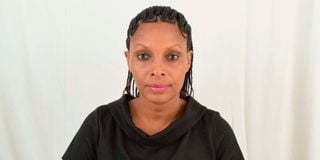My past experience inspired me to start empowerment advocacy

Joy Kamau is the CEO and founder of Better Lives, a community-based organisation that advocates and promotes human rights, and champions for girls' and women's empowerment.
What you need to know:
- Born and raised in Nairobi’s Kibra, Joy Kamau saw her age mates and friends lack basics like clean water, proper toilets, meals, security, education facilities, recreational activities and sanitary towels.
- Her work now entails advancing gender equity and human rights through mentorship, and advocating for justice and fair treatment of the poor and marginalised.
The issue of women's empowerment and gender equality tops the list of agendas across the world.
Empowered women and girls contribute to the health and productivity of their families, communities and countries, creating a ripple effect that benefits everyone.
Gender-based discrimination and inequalities are very much apparent and Joy Kamau has taken the initiative to work towards alleviating such problems.
She is the chief executive officer and founder of Better Lives, a community-based organisation in Nakuru County that advocates and promotes human rights, and champions for girls’ and women’s empowerment.
Born and raised in Nairobi’s Kibra, Ms Kamau, a sociology graduate from the University of Nairobi was lucky to access many things a young girl in the slum only wished for.
Sanitary towels
“Many of my age mates and friends could not access basics like clean water, proper toilets, meals, security, education facilities, recreational activities and sanitary towels,” she says.
Crime, alcoholism, violence, especially domestic violence and gender-based violence were common, she adds. This exposed many adolescents to early sexual activities and other social deviant behaviours.
“I was shocked when I later joined a boarding school in Kajiado County and learnt about Female Genital Mutilation (FGM) and early marriages. Many girls from the Maasai community took refuge in the school, running away from their families to be safe from FGM and arranged marriages,” says the 40-year-old.
Ms Kamau, who is passionate about issues affecting women and girls, says it was at that time that she realised women and girls in other parts of the country also faced other forms of violence and challenges.
“As a young woman, I felt like men had an advantage over women. Later, I learnt about the abuse of women’s rights and how they are silenced by culture through socialisation. I wished for an equitable world. Where all people were treated fairly and given equal opportunities,” she says.
Her past experiences and the societal expectations on women and girls, inspired her to start women empowerment advocacy.

Some of the girls supported by Joy Kamau's organisation during one of their training/mentorship sessions.
“The society seems to have put women and girls at a secondary position. Men are the decision makers. Women can express what they want and even help in attaining the sustainable development goals faster, in collaboration with men,” she says.
Ms Kamau’s work entails advancing gender equity and human rights through mentorship. She advocates for justice and fair treatment of the poor and marginalised.
“My goal is to make the world a better place for women, youth and children. I educate them on their rights, preventing and addressing gender-based violence (GBV). These include their relationships, psycho-social support, mental and reproductive health with emphasis on menstrual hygiene and economic empowerment,” she says.
She also trains them on how to make shaggy mats and other artistic skills to empower them economically.
Although funding has always been a challenge, the Covid-19 pandemic has worsened the situation, making it difficult for her to reach more women.
“The restrictions have affected our meetings. We have called off many. The beneficiaries can also not afford internet/Wi-Fi to facilitate online meetings,” she adds.
Ms Kamau hopes that through her organisation’s activities, the youth too, will be empowered to live better lives free from violence; and make informed decisions regarding their lives.
“I wish to reach out to more women and girls in Kenya. I hope to also influence some policies that will enhance equality like the removal of tax levied on tampons and sanitary towels,” she says, noting that it will reduce the economic pressure on women and girls’ lives. I hope for a society where women and children have affordable health, education and equal opportunities,” she says.
Include boys
As an organisation, Better Lives has a holistic approach. Although its programs mainly involves women and girls, they also hope to include boys going forward.
“We believe inclusivity is paramount for sustainable development. We have many boys dropping out of school to engage in businesses like boda boda while others join criminal gangs. It should, however, not be assumed that both genders are at the same level, girls still lag behind,” says Ms Kamau.
Beneficiaries of the mentorship and empowerment sessions meet at a common venue where content delivery and interactive sessions take place. At the end of the meetings, participants receive dignity packs containing the basics women and girls need.
“I make home visits to collect data and understand our clients’ backgrounds – whether they fit in the criteria to join the program. I work in collaboration with community health workers in the villages,” she says.
Once in a while, they distribute food to elderly women, especially during the Covid-19 period.
“I also do field visits for evaluation and monitoring to assess the impact and success of the programs,” adds Ms Kamau.
They receive funds from well-wishers, mainly family and friends and have also partnered with other organisations in the community.





